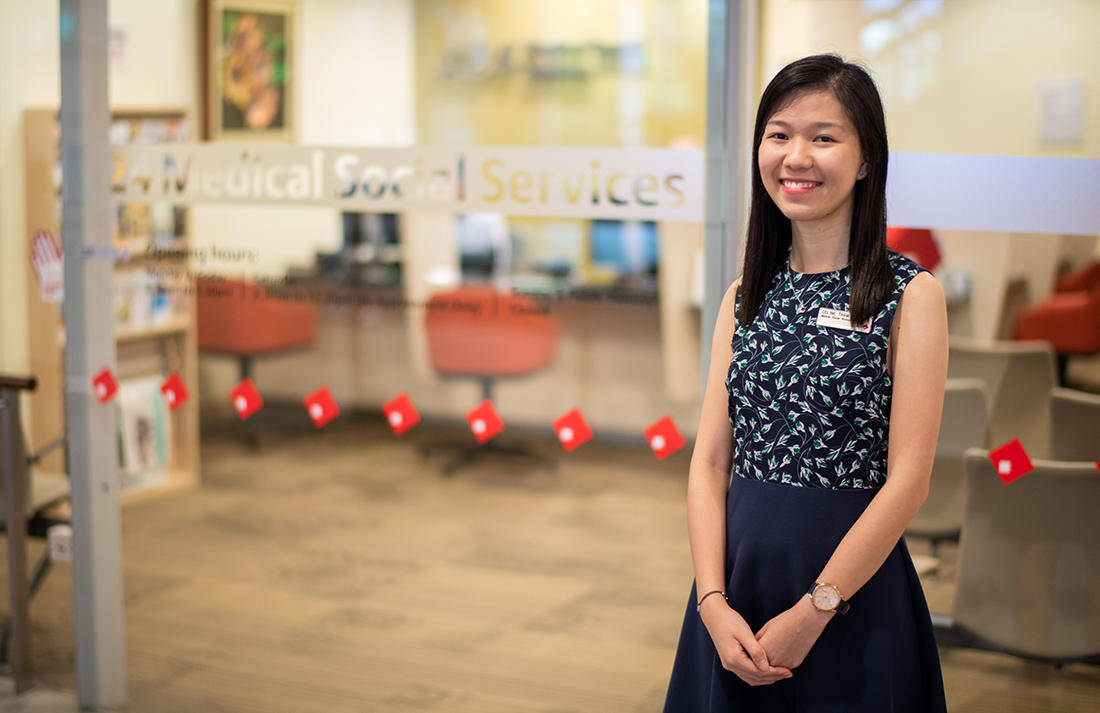As an integrated academic and regional health system, the NUHS delivers value-driven, innovative, and sustainable healthcare in Singapore. Leveraging on its unique position as an Academic Health System, NUHS taps on the wealth of resources residing within the National University of Singapore (NUS), drawing upon each faculty’s academic, research, and creative capabilities.
NUHS also seeks to enrich the field of medical talent in Singapore, contributing to a more robust healthcare system for the nation. To this end, NUHS offers scholarships to talented individuals with a passion for healthcare, like 23-year-old Celine Tham.
What are the key qualities that a medical social worker should possess?
I think that the most important quality that a medical social worker should possess is an aptitude for continuous learning. A medical social worker should also be someone who is able to adapt quickly to situations. You are also expected to have a basic understanding of medical conditions and their trajectories to better appreciate how your patients’ physical health affects other aspects of their lives. This includes understanding how, for instance, having to be compliant to certain medications such as insulin injections would impact your patients’ social lives and their perceptions of themselves as a person.

Celine Tham Yi Xin
Medical Social Worker
Bachelor of Social Sciences (Honours)
– National University of Singapore
Share with us a memorable experience in the course of your work.
One experience that has stayed with me is my encounter with a male patient who was frequently re-admitted. I was in touch with him and his family for close to half a year as he dealt with issues of physical loss, gradually having parts of his leg removed over multiple surgeries. There was also psychological loss as he had to be more dependent on his wife who was his caregiver. In my sessions with him, we explored what his losses meant to him. Towards the end of his life, we also worked through his feelings of resentment and apprehension towards the possibility of being sent to a nursing home.
He eventually passed on in the hospital. Even though not all issues were fully resolved, I felt that I had managed to walk with him through his emotional journey of coping with his losses. To me, the beauty of counselling and social work lies not in resolving or “conquering” problems faced by patients, but in remaining a constant presence in the journeys undertaken by patients in undergoing medical treatment. This experience was a poignant one for me as it reminded me that often, people are not searching for solutions, but instead, they are yearning to be heard and supported as they go along their lives.
“Even though not all issues were fully resolved, I felt that I had managed to walk with him through his emotional journey of coping with his losses.”Celine Tham
What are the dynamic career opportunities that NUHS provided you with?
As a junior social worker who is just starting out in the workforce, I have already experienced various courses and workshops offered by NUHS that are designed to build my capabilities as a healthcare professional. These workshops have equipped me with various skills such as conducting quality improvement projects and providing suicide first aid. In NUHS, I am empowered to take on inter-departmental projects and improve internal processes within my department.
What are the greatest skills and lessons you’ve learned so far in your role as a medical social worker?
I have learnt from first-hand experience the importance of having clear and effective communication with other healthcare professionals. We are all experts in our own fields. It is only when we work together to make a holistic assessment of the patient’s situation that we can make interventions that will benefit our patients in their best interests.
I’ve also realised that it’s very easy to get caught in the hectic daily work of a medical social worker and just perform task after task. It is easy to lose sight of what is most important in our work with patients – providing a listening ear for patients. I have learnt that many times, our patients and even their family members and caregivers simply hope for someone to hear their stories and provide emotional support for them. It is only when they feel understood and when we have a clear picture of what is going on, that we can begin to work together on solutions.
What advice or tips do you have for those looking to apply for this scholarship?
I would say that it would be good to have basic knowledge or exposure to the medical setting before deciding to apply for this scholarship. Truth be told, the fast-paced working life in the medical setting is not for everyone and it can be hard to make a scholarship or job decision as a young adult. If you are truly passionate about contributing and making a difference to the healthcare sector, be confident of your passions and be true to yourself. Bring these into your application and interview process and I believe that you will be successful.